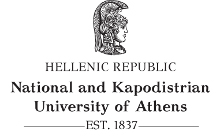4th Naxos Summer School & Workshop
LANGUAGE VARIATION AND CHANGE IN ANCIENT AND MEDIEVAL EUROPE: Old & Middle English - Old High German - Old Norse - Old Romance - Ancient Greek
OLGA FISCHER: THE PLACE OF ANALOGY IN LANGUAGE LEARNING, LANGUAGE USE, AND LANGUAGE CHANGE
Saturday, August 3, 2019
Olga Fischer
(University of Amsterdam, ACLC)
The Place of Analogy in Language Learning, Language Use, and Language Change
In my talk I will broadly consider what the role is of analogy in the way we learn language, what its place is in the (biological) system of grammar that each individual adult language user develops in the course of his/her life ─ and how this, in turn, affects the theoretical model(s) of language that linguists develop ─ in order to answer the question whether and to what extent analogy helps to explain what happens in language use and language change.
I will start with the place given to analogy in Hermann Paul’s Prinzipien der Sprachgeschichte, and contrast his views to that of the traditional Neogrammarians for whom analogy was an exception (falsche Analogie): sound changes were seen as laws, with exceptions to these inexorably relegated to the ‘back-benches’. A strong dislike of analogy is also found in the Transformational Generative tradition (cf. Kiparsky 1974, Lightfoot 1979: 359ff. and many others). The thinking there was (and still is) that analogy cannot be captured within rules, it is taxonomic and unrestrictive, making analogical explanations ‘arbitrary’.
I would next like to look at advances made in more recent (psycho)linguistic research and cognitive science, to see where these have brought us. Based on these findings, I will put in a plea for analogy as the basic principle in language acquisition and change. I will argue (pace most generative models, pace grammaticalization theory (cf. Traugott and Hopper 2003: 310, and historical linguists such as Harris and Campbell (1995: 50-51), that re-analysis is not primary but should be seen as a meta-linguistic mechanism; a mechanism that describes change but does not explain why and how change takes place. Similarly in synchronic models, ‘rules’ describe and show regularities, but do not explain them.
